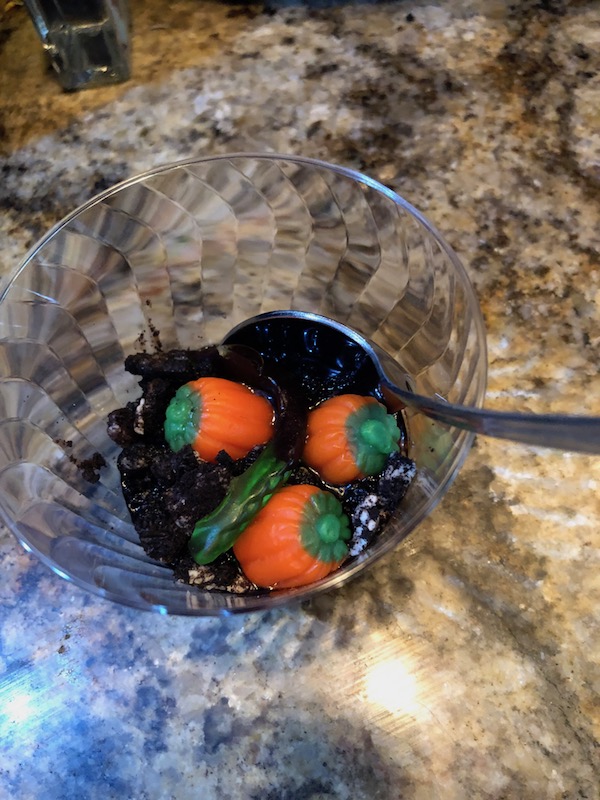“You want my dirt?”
The little voice piped up next to my chair while I was talking with one of our parishioners at our Garden Harvest festival and trunk or treat last Saturday. She was dressed in the costume of a blue monster with big white eyes.
“What’s that, kiddo?” I asked, because for the life of me, all I could think of was a truthful answer in the negative.
“I made you dirt cake. I made it for you!” and she placed a clear plastic cup in front of me with a beaming expression. Picking it up, I could see layers of pudding and crumbled oreos, topped with two candy pumpkins, and three gummi worms. O-KAY! Now this is a dirt cake I could get behind.
“Oh, thank you! This looks delicious!” I told her, and gave her a side-hug. She was slightly sticky and smelled like sugar and soap, which is just how I like my blue monsters. Besides, Gummi ANYTHING is a favorite kind of candy, and she had given me THREE of those bad boys.
“It’s upside down!” she laughed.
“Oh? How so? The pumpkins grow above the ground, don’t they?” I responded, looking closer.
“Yes—but the worms are on top—see? Upside down!” And she scampered away after hugging me again, laughing as I slurped one of the worms down because I couldn’t help myself.
Never have I had such a delicious gospel lesson.
Last week in our gospel, we heard the story of one man who was sure he belonged on top because he thought himself perfect, and another man who thought he was a worm due to his own acknowledgement of his sins. Yet it was the man who bewailed his sins and prayed to God for mercy who was justified, Jesus tells us. That’s a declaration that is a huge reversal to what most of us witness in our lives. We don’t need to think of ourselves as worms, of course, but to acknowledge the shortcomings we have embraced, and the times we have been comfortable with idea that the suffering of others is somehow deserved, forgetting how beloved each and every soul is by God, is a vital part of making room in our lives for the planting of the Way of Love in our hearts.
How many times does Jesus tell us, however, that it is the side of the downtrodden of the world that will be raised up—the poor, the hungry, the weeping, the homeless, the aching, the traumatized? And this week, as we commemorate All Saints’ Day, whether on Friday or at our weekend services, we will hear Jesus talk about an upside-down world in Luke’s pointed version of the Beatitudes. Luke’s version includes both blessings and woes, and they parallel each other perfectly, and turn the structure of society, then and now, upside-down. And it’s a perfect reminder for the Feast of All Saints, for if you look at their lives, that’s the gospel they embodied as well—and that they call us to embrace.
Jesus constantly reinforced the insistence from the beginning of the Hebrew scriptures that God calls us to protect and care for those who are “the least of these” in his words. For the last several weeks, in fact, Jesus has been giving us some version of this gospel teaching, so I guess from a faith perspective we could say that blessing the poor, the hungry, and the weeping is NOT upside down at all, but instead the Rightside-Up message of the gospel. A side to which we commit ourselves each day in our journey of faith.
The Rev. Leslie Scoopmire is a retired teacher and a priest in the Diocese of Missouri. She is priest-in-charge of St. Martin’s Episcopal Church in Ellisville, MO. She posts daily prayers at her blog Abiding In Hope, and collects spiritual writings and images at Poems, Psalms, and Prayers.

